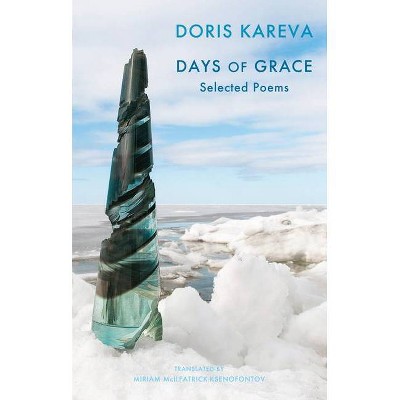Days of Grace - by Doris Kareva (Paperback)

Similar Products
Products of same category from the store
AllProduct info
<p/><br></br><p><b> About the Book </b></p></br></br>Doris Kareva is one of Estonia's leading poets, admired especially for poems that balance precision and control with passion and bravado.<p/><br></br><p><b> Book Synopsis </b></p></br></br>Doris Kareva is one of Estonia's leading poets, admired especially for poems that balance precision and control with passion and bravado. Her achievement, according to Estonian Literature, is in writing poems which are both `plentiful and fragile like a crystal...balancing on the line between the human soul and the universe, between sound and silence'. Days of Grace spans over forty years of her poetic output, showing how the sustained depth and clarity of her poetry lies in her ability to create ambiguity and suggest harmony at the same time, with a multiplicity of meanings generating the opposite of clarity: a form of hinting which at its most illuminating becomes utterly oracle-like. Such is the metaphysical sensitivity of her poetry that its moral charge is sensed almost physically. She has also been called `a priestess of love' who is fearless as well as discreet in her portrayal of love that is so `pure and elevating like mountain air' that she seems to be writing from another time or dimension.<p/><br></br><p><b> Review Quotes </b></p></br></br><br>McIlfatrick-Ksenofontov's translations capture the barely capturable essence of Doris Kareva's poems which, quite suddenly, make me think of snowflakes, crystalline, and yet on the cusp of disappearance.' - Marius Kociejowski<br><p/><br></br><p><b> About the Author </b></p></br></br>Doris Kareva is one of Estonia's leading poets. She was born in Tallinn in 1958, daughter of the composer Hillar Kareva, and published her first poems at the age of 14. In 1977 she entered the University of Tartu as an already acknowledged young poet. Due to her dissident connections she was expelled but graduated as a distance student in Romance and Germanic philology. She has worked for the cultural weekly Sirp (Sickle) and as the Secretary-General of the Estonian National Commission for UNESCO from 1992 to 2008, and is currently an editor for the literary journal Looming (Creation). Following the restoration of Estonian independence, Kareva's collection In Place of the World received the national cultural prize in 1993. She used the prize money to set up the `Straw Stipend' for the publication of debut collections, to support emerging talent in unsettled times. Kareva has published 15 collections of poetry, a collection of essays and a work of prose. She has also translated poetry (Anna Akhmatova, Emily Bronte, Emily Dickinson, Kabir, Rumi) and plays, essays and prose (W.H. Auden, Samuel Beckett, Joseph Brodsky, Kahlil Gibran, Shakespeare). She has compiled anthologies, written texts for music and theatre, and given lectures on culture, education and ethics in Estonia and abroad. Her poetry has been translated into over 20 languages and has inspired composers and directors in Estonia and abroad - sounding equally fitting at a punk concert and the funeral ceremony of a president, in a Warner Classics studio and at the Estonian Song Festival. Kareva has been honoured with two national cultural prizes and four literary prizes; in 2001 she was awarded the Estonian Order of the White Star. She has two books of poetry in English translation, Shape of Time, translated by Tiina Aleman (Arc Publications, 2010), and Days of Grace: Selected Poems, translated by Miriam McIlfatrick-Ksenofontov (Bloodaxe Books, 2018).
Price History
Price Archive shows prices from various stores, lets you see history and find the cheapest. There is no actual sale on the website. For all support, inquiry and suggestion messages communication@pricearchive.us




















